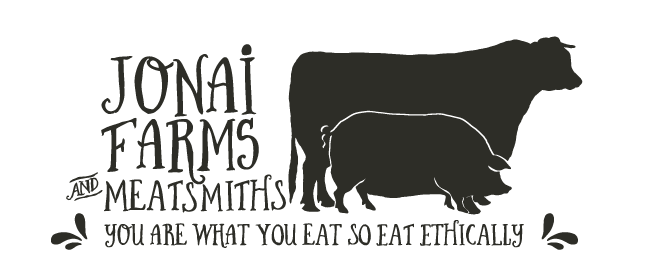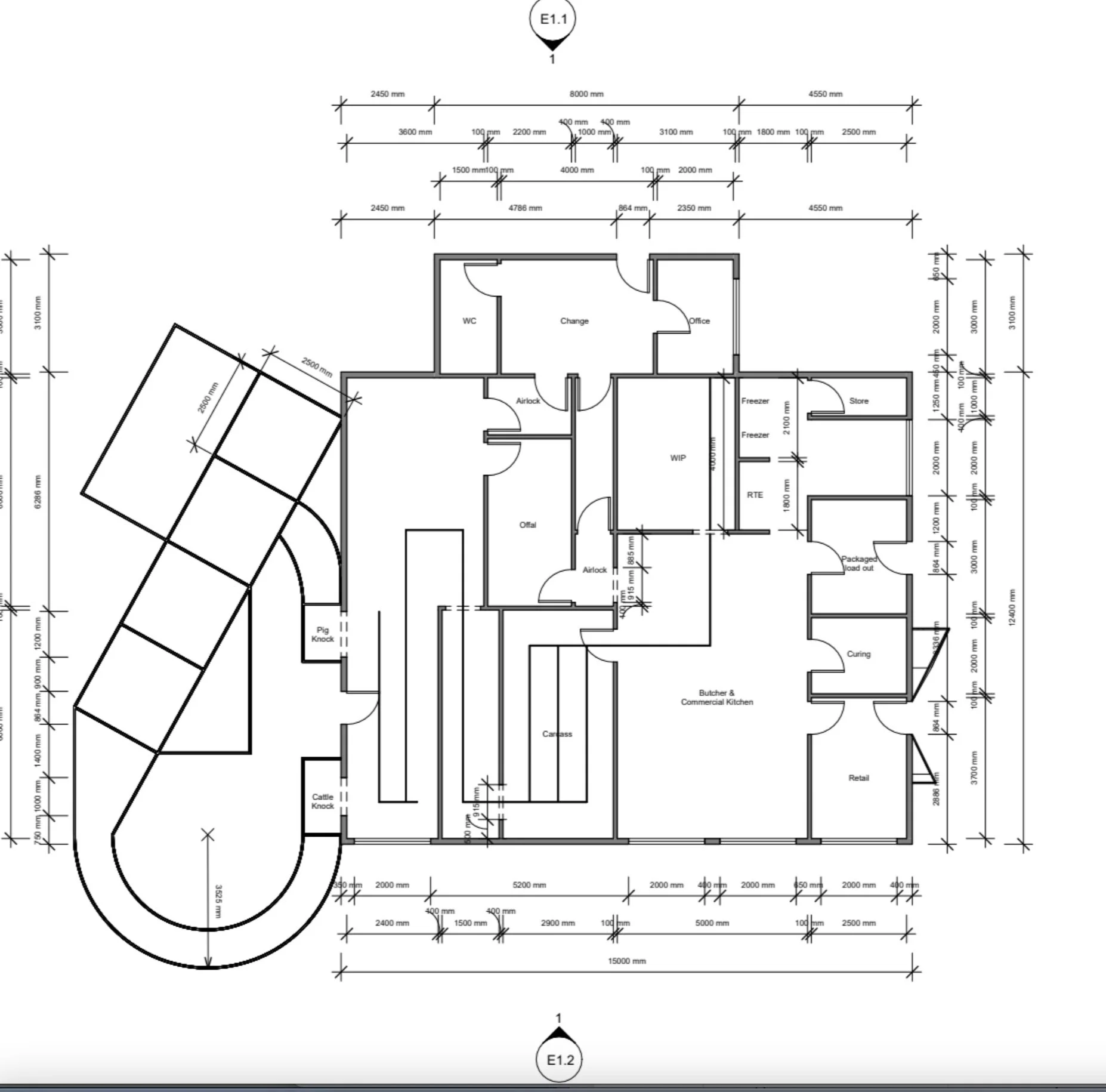reciprocity can build community infrastructure
As at 31 December 2025
FUNDS RAISED = $187,968
FUNDS SPENT = $190,422
UPDATE (JUNE 2025): The video below on the wonderful Tim Thompson’s Farm Learning youtube channel tells the whole story of the micro-abattoir project to date (filmed just a week ago). Since the video went live, we have been inundated with enquiries and enthusiasm for the project, and so are hosting an open day here at the farm on Tuesday 22 July 2025 to share everything we’ve learned. Tim’s support has also seen cookbook sales skyrocket, and we are shipping them as quickly as we can around all of the usual farm and butchery demands! Thank you to everyone who has bought a cookbook (really a food sovereignty warrior’s handbook disguised as a cookbook) - all proceeds are helping us finish the build!
UPDATE (DECEMBER 2024): With the announcement from Kilcoy (the multinational corporation who purchased Hardwicks abattoir in 2021) that they will no longer take lots of less than 15 cattle or 50 sheep, the urgency of our project just cranked up. While the Australian Food Sovereignty Alliance (AFSA) is working hard to help farmers secure an extension at least to the middle of next year, and working closely with the government to find ways to make micro-abattoirs easier to develop, it is a very uncertain time for Victorian small-scale livestock farmers.
We have revisited our budget and realise we still need at least another $25k to complete the project. This is because we wasted $25k on consultants who gave us no benefit, and expensive reports required for the permit that could have been avoided if micro-abattoirs were considered ‘rural industry’ - a Section 1 use in the Farming Zone (and Rural Activity, Green Wedge and Green Wedge A Zones) - so no permit required. In regards to the consultants, we have long eschewed the need for that form of value extraction in our operations, but fell prey to our own lack of confidence that we could design the facility ourselves (in spite of having toured dozens and worked in a few). The fact is, the designer we engaged could not grasp the ‘micro’ nature of the project, and $13,000 later we parted ways with a million dollar useless design. We continued our research, visited and worked in more abattoirs, and designed the facility that Stuart is now about half way through building. (If there are any local boilermakers out there keen to lend a hand for a few days soon, he could use it as he erects the steel frame for the salle de mort and fabricates the rails!)
We need to raise $150,000 to build a vehicle-based abattoir, and we are committed to feeding local communities rather than banks and shareholders. Our years of lived, read, and listened research into what makes and breaks small-scale farming constantly affirm our belief that one of the most important keys to a successful farming livelihood is to avoid debt. If we had to service a debt through the lean times as well as the bountiful, we might not make it. Our farm is built on relations, not transactions, which permeate every aspect of our ecosystem from sourcing waste-stream feed and being a CSA farm, to sharing land rent-free with Tumpinyeri Growers and exchanging labour with Pig & Earth Farm in our boning room.
In 2013, we raised $31,750 to build the on-farm butcher’s shop, and in 2014, $35,600 to build the commercial kitchen and curing room. We used Pozible for those campaigns, and rewards exchanged for pledges included meat and workshop attendance.
This is a much more significant sum we need to raise, and as we have been a community-supported-agriculture (CSA) farm for a decade, all but about 5% of our meat is already spoken for. We are offering pre-purchases of Tammi’s cookbook - ‘Eat Like the Jonai’, and have no more Speckleline hide left for sale (as Hardwicks no longer allow us to retain hides from slaughter).
At a spectacular nose-to-tail feast hosted here on the farm in partnership with Pig & Earth Farm, Bar Merenda, and La Pinta on Monday 3 June 2024, with loads of support from other farmers, chefs, CSA members, and generally excellent humans, we raised $16,200. The raffle and dinner brought together 15 farms, 16 makers, 10 restaurants, 3 retailers, and a tourism operator, who pooled our collective efforts with a healthy dose of ‘here’s something I prepared earlier’ to deliver an epic prize pool for the raffle, raising a further $39,500! A surprise auction raised another $9,700 on the night!
Thanks so much to Kaiya Rae (@creating.ripples_) for this stunning video, which captures the warmth and beauty of our incredible community on the night of the big fundraiser dinner. <3
As people who have dedicated our lives to food sovereignty and agroecology (Tammi has been a leader of the Australian Food Sovereignty Alliance (AFSA) for more than ten years, donating half her time to advocating for everyone’s right to participate in food and agriculture systems), we share everything and practice radical transparency about both our successes and our failures (check out the farm blog for those stories). We have been sharing our documentation in ad hoc ways with other farmers for years, and now are collating them here for anyone to access.
The Meat Collective @ Jonai will serve not only us, but also several other local farms with whom we are in relations, and operate as a not-for-profit solidarity economy on degrowth principles. We are strongly guided by ethics of fairness – central to which is a notion of ‘enoughness’. We talk about each of us receiving and giving mutual aid ‘commensurate with need and capacity’. If sustainability is dealing justly with future generations, it must obviously start NOW with current generations in our dealings with the human and more-than-human world.
In practice, what that means for the abattoir is that fees will be democratically set by all farmer members of the collective to cover costs of operation (energy, compliance, consumables, etc) and ensure all meatsmiths earn a decent livelihood. Critically, no surplus value will be extracted from the system - there are no ‘investors’ and no financial returns beyond the wages earned by those of us doing the labour. The returns are so much more than money, and include beneficial environmental custodianship, highest animal welfare outcomes, and farmer autonomy and well being.
While fundraising for our micro-abattoir to enable the livelihoods of local farmers here in the southern highlands of Djaara Country, we are busy supporting other communities to do the same in communities across Australia. AFSA is advocating for legislative reform to make it easier to build and operate slaughter facilities such as ours - what Tammi calls the ‘intrinsic infrastructure of agroecology’. You can read about AFSA’s proposed reforms to the Victorian Planning Provisions here.
You can find below our successful development applications for both the pig farm and the abattoir, with associated materials such as our environmental management plan (EMP). These documents took a lot of time and knowledge, and some call this Intellectual Property (IP) - but we think protecting that from others’ use or charging a fortune for it is a major barrier to democratic participation and equitable distribution of resources, except in the case of Indigenous Peoples protecting their traditional and cultural knowledge and genetic resources from exploitation by colonial capitalist powers.
Providing financial support for us to build the micro-abattoir will further enable our efforts to radically transform the food system from the ground up. And if you are not in a position to offer any cash to the project, we are grateful for any way you can help spread the word, both for the success of the Meat Collective @ Jonai, and to see more meat collectives emerge across Australia!
For those following the Jonai story since back when we began in 2011, and our first crowdfunding successes in 2013 and 2014, you will know we are strongly avoidant of debt, and we encourage other communities to look to this model of working collaboratively, spreading the load amongst many, to raise the funds needed to (re)build the intrinsic infrastructure of agroecology.
our offerings - jonai documentation
Pig farm development application
Up until 2015 in Victoria, pastured pig farms were generally not required to obtain a permit to operate. You can read the story about how that changed due to a precedent set at VCAT that defined pastured pig farms as ‘intensive animal husbandry’, and the work the Australian Food Sovereignty Alliance (AFSA) did to achieve what are called the Low Density Mobile Outdoor Pig and Poultry Guidelines (LDMO) here. We won this recognition of the much lower risk pastured pigs and poultry present to environment and amenity in 2018, and Jonai Farms & Meatsmiths obtained our permit in 2021.
You can access the DA here, and use it as a template for both agroecological farming with pigs and to obtain a permit for your farm. (NB In 2022, New South Wales passed legislation subsequent to AFSA’s lobbying that exempts pig farms with less than 20 sows or poultry farms with less than 1000 birds. Check with AFSA for requirements in your state.)
abattoir development application
After years of research and working our way through the requirements of the planning scheme for an abattoir (which in Victoria is a Section 2 use in the Farming Zone under Rural Industry requiring a permit), in July 2023 Hepburn Shire Council gave notice of intent to grant a permit (read the ABC story on the decision and our plans here). There were no objections from the CMA, EPA or Goulburn Murray Water.
While there were 30 objections (and 27 letters of support), the planners recommended (and commended) the project for its sustainability and ethical values. Read our responses to the objections here.
You can access it here, and the floor plan and elevations here. The project is now with the engineers to do the detailed drawings, at which point we can apply for the building permit.
environmental management plan (EMP)
As part of the DA for the abattoir, we were required to submit an EMP. We took a strong circular economy approach, outlining our plans to utilise everything from each carcass (offal & blood for edible products, intestines for sausage casings, and hides to be sent off for tanning in Ballarat), and incorporated on-farm management of surplus nutrient using Audrey - the rotating composting drum Stuart built in 2021.
You can access the EMP here.







